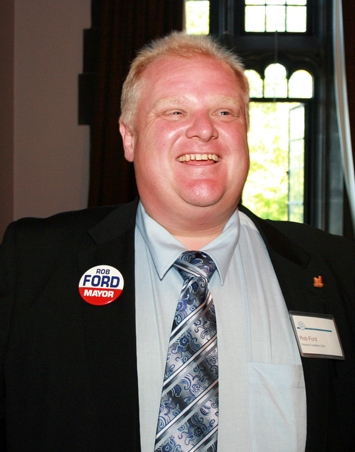Growing Up with Addiction: An Open Letter to Rob Ford's Children

Watching a parent spiral through the cycles of alcoholism feels relentless. Not the slow decline of so many other tragedies, it's an ever-changing nightmare ride navigated by broken promises and unpredictable behaviour. Cliché, but clichés apply here. It can take years to extricate yourself from these cycles and reach a point where they no longer define your every relationship and interaction.
To anyone who has been close to a person suffering from addiction, the patterns of Rob Ford's recent behaviour are in no way surprising, insofar as you quickly come to learn that nothing is out of the question when someone's actions are being determined by forces greater than reason. (More surprising, almost, the public response that so ironically mirrors the cycle of an addict: Constant expectation of satisfaction from a source that is logically unable to provide it.)
The only people who truly understand what it's like to grow up with substance abuse as a constant additional family member are those who have lived through it: Addicts themselves, or those who have been close to someone struggling with addiction. Often, keeping the reality hidden is paramount. The most important thing. A constant strain, demanding so much energy; it also provides a false sense of control.
The dark periods are bad, worrying that an empty driveway means something far more sinister, staying awake through shouting matches and slamming doors. But almost worse are the good periods, those moments that provide a glimpse into how easy, how almost surreally wonderful, things could be if your family was just normal. Because all the pieces are there. It's not the people who are the problem. It's the addiction, the disease, the uncontrollable impulse that drags everyone down with it.
When reports of Rob Ford's various substance abuse issues began to circulate, my initial reaction was a guttural rage. As a citizen, as a journalist, I knew I was supposed to champion the exposure of potential wrongdoing. But I know what the air in the Ford's house feels like right now. I know the expression on his wife's face. I've seen it a hundred times. I know what it's like to watch someone you love behave in a way you hate and not understand why, because children can't possibly understand addiction. So every time I see Ford's face on a screen, I don't think of taxpayers. I think of his kids. And I think of the fact that they have been unable to determine how, and when, they will share the reality of their father's behaviour with the people in their lives.
But to live with someone else's secrets is to have the right to your own experience taken away. Being able to hide an addict's behaviour may feel like something that gives you a sense of control over how much it affects your life, but just as it is important for addicts to admit to their problems before they are able to recover, so to is it important for those of us affected by their behaviour to stop participating in creating an enabled world where it's okay. There is a great freedom that comes with no longer having to bear those secrets for someone else, no longer having to harm yourself to protect someone else. While I can't imagine how horrible it must be for Rob Ford's kids to answer the schoolyard questions I'm sure are coming their way, I can tell them that there is a certain gift that comes with breaking the cycle of secrecy.





